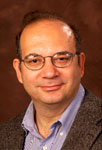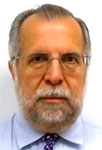Friedrich Katz and the Mexican Revolution
Monday, July 16
Venue: University of Vienna, AudiMax, Dr. Karl-Lueger-Ring 1 - renamed "Universitätsring", 1010 Vienna
Keynote: Revolution, international history and social history: about the contribution of F. Katz
Keynote Speaker: Claudio Lomnitz, Columbia University
Monday, July 16, 2.30 p.m. - 3.30 p.m.
The studies of Friedrich Katz revolutionized the Mexican revolution, by extracting it from the field of national history, in order to put it in a determined and definitive way in an international context, and also in a comparative framework. Katz’s achievement was obtained with a double compromise, with the history of international relations, and with the social history of Mexico. Thanks to this bifocal lens, Katz shows the way in which the revolutionary process is transformed by considerations of international politics, and how the politics of the big powers are conditioned by the internal social and political processes of Mexico. In this conference, I formalize some implications of Katz’s studies for the study of the revolution as international process (that is, of intergovernmental relations) and as transnational process (that is to say, of social relations that cross the international border).

Claudio Lomnitz:
Claudio Lomnitz is William H. Ransford Professor of Anthropology at Columbia University and director of the Center for the Study of Ethnicity and Race. He works on the history, politics and culture of Latin America, focusing on issues such as nationalism, crisis and socialism and revolution, particularly in Mexico. Before joining Columbia, Lomnitz taught at the New York University, New School University, the University of Chicago and the Colegio de México. In 2011-12, he was a research fellow at the Wissenschaftskolleg Berlin. Lomnitz servers as editor of the journal Public Culture.
Roundtable
The Transnationalization of the Mexican Revolution and Contemporary Latin-Americanism
Monday, July 16, 3.30 p.m. - 5 p.m.
Transnationality and the transgression of epistemic spaces are categories applicable both to Friedrich Katz’ life and his work. Born in Vienna, Katz escaped the Nazi terror to Mexico. As a historian, he started his studies at in Mexico and continued them in the USA, Austria and Germany. He became one of the leading specialists on Mexican history, eventually as professor of Latin American history at the University of Chicago. While his life mirrored all (voluntary and involuntary) aspects of 20th century cosmopolitanism, his work was no less transnational. It was the polyglot and versatile Friedrich Katz who studied the Mexican Revolution in archives all over the Atlantic world and established the global significance of an event hitherto assessed as of rather regional importance. Emanating from Katz’ life and oeuvre, the panelists will discuss core aspects of the main team of 54 ICA – the crossing of regional and disciplinary boundaries in Americanist research.
Roundtable Participants

Marianne Braig, FU Berlin
Professor Braig was appointed professor for Latin American politics in 2002. Before that, she taught political science at the Johann Wolfgang Goethe-Universität Frankfurt am Main (1997-2002) and held visiting professorships in Mexico (UNAM and Colegio de México), Santiago de Chile and São Paulo. She specializes in social policies and the transnational entanglements of political cultures and public spheres.

Javier Garciadiego, Colegio de México
Javier Garciadiego Dantán is president of the renowned Colegio de México and a specialist in the Mexican Revolution. He is a former director-general of the National Institute of Historical Studies on the Mexican Revolutions (INEHRM), has authored several books and holds the 12th seat of the Mexican Academy of History. Garciadiego received a doctorate in history at the Colegio de México and a second one at the University of Chicago, where he was advised by Friedrich Katz. He joined the Colegio de México as a professor in 1991 and has worked as visiting scholar at the St Anthony's College, University of Oxford; the University of Chicago; the Trinity College, Dublin; the Complutense University of Madrid and the University of Salamanca.
Emilio Kourí, University of Chicago
Professor Kourí is the director of the Katz Center for Mexican Studies. His main scholarly interest is in the social and economic history of rural Mexico since Independence. He is the author of A Pueblo Divided: Business, Property, and Community in Papantla, Mexico, and his current research project is an examination of the idea of the "Indian pueblo" in 19th and 20th century Mexican thought, law, and political discourse.
Moderation: Berthold Molden, University of Vienna
Berthold Molden, Secretary General of the 54 ICA, is a contemporary historian specializing in the global intellectual history of the Cold War, particularly in Latin America, Europe and the USA, as well as media history. Berthold was project director for Cold War Memory Studies at the Ludwig Boltzmann Institute for European History and Public Spheres in Vienna. He has been teaching as visiting professor and university lecturer at the University of Vienna, the University of California, Santa Barbara, the University of Innsbruck and the University of Chicago. He also was a Research Fellow at the Asociación para el Avance de las Ciencias Sociales, Guatemala. Most recently, Berthold Molden was appointed Marshall Plan Chair 2012-13 at the University of New Orleans.
